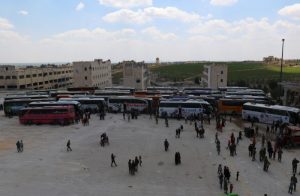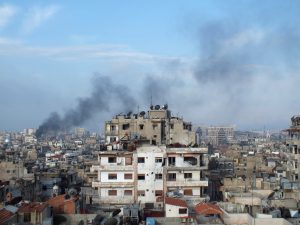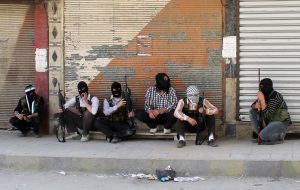
By Rinat Sagdiev, Maria Tsvetkova and Olena Vasina
MOSCOW/KIEV (Reuters) – In a corner of the departures area at Rostov airport in southern Russia, a group of about 130 men, many of them carrying overstuffed military-style rucksacks, lined up at four check-in desks beneath screens that showed no flight number or destination.
When a Reuters reporter asked the men about their destination, one said: “We signed a piece of paper – we’re not allowed to say anything. Any minute the boss will come and we’ll get into trouble.
“You too,” he warned.
The chartered Airbus A320 waiting on the tarmac for them had just flown in from the Syrian capital, Damascus, disgorging about 30 men with tanned faces into the largely deserted arrivals area. Most were in camouflage gear and khaki desert boots. Some were toting bags from the Damascus airport duty-free.
The men were private Russian military contractors, the latest human cargo in a secretive airlift using civilian planes to ferry military support to Syrian President Bashar al-Assad in his six-year fight against rebels, a Reuters investigation of the logistical network behind Assad’s forces has uncovered.
The Airbus they flew on was just one of dozens of aircraft that once belonged to mainstream European and U.S. aviation companies, then were passed through a web of intermediary companies and offshore firms to Middle Eastern airlines subject to U.S. sanctions – moves that Washington alleges are helping Syria bypass the sanctions.
The flights in and out of Rostov, which no organization has previously documented, are operated by Cham Wings, a Syrian airline hit with U.S. sanctions in 2016 for allegedly transporting pro-Assad fighters to Syria and helping Syrian military intelligence transport weapons and equipment. The flights, which almost always land late at night, don’t appear in any airport or airline timetables, and fly in from either Damascus or Latakia, a Syrian city where Russia has a military base.
The operation lays bare the gaps in the U.S. sanctions, which are designed to starve Assad and his allies in Iran’s Revolutionary Guard and the Hezbollah militia of the men and materiel they need to wage their military campaign.
It also provides a glimpse of the methods used to send private Russian military contractors to Syria – a deployment the Kremlin insists does not exist. Russian officials say Moscow’s presence is limited to air strikes, training of Syrian forces and small numbers of special forces troops.
Reuters reporters staked out the Rostov airport, logged the unusual flights using publicly available flight-tracking data, searched aircraft ownership registries and conducted dozens of interviews, including a meeting at a fashionable restaurant with a former Soviet marine major on a U.S. government blacklist.
Asked about the flights and the activities of Russian private military contractors in Syria, a spokesman for Russian President Vladimir Putin referred Reuters to the Defence Ministry – which didn’t reply to the questions. The Syrian government also didn’t reply to questions.
In response to detailed Reuters questions, Cham Wings said only that information on where it flies was available on its website.
The flights to Rostov aren’t mentioned on the site. But the journeys do appear in online flight-tracking databases. Reporters traced flights between the Rostov airport and Syria from Jan. 5, 2017, to March 11, 2018. In that time, Cham Wings aircraft made 51 round trips, each time using Airbus A320 jets that can carry up to 180 passengers.
The issue of military casualties is highly sensitive in Russia, where memories linger of operations in Chechnya and Afghanistan that dragged on for years. Friends and relatives of the contractors suspect Moscow is using the private fighters in Syria because that way it can put more boots on the ground without risking regular soldiers, whose deaths have to be accounted for.
Forty-four regular Russian service personnel have died in Syria since the start of the operation there in September 2015, Russian authorities have said. A Reuters tally based on accounts from families and friends of the dead and local officials suggests that at least 40 contractors were killed between January and August 2017 alone.
One contractor killed in Syria left Russia on a date that tallies with one of the mysterious nighttime flights out of Rostov, his widow said. The death certificate issued by the Russian consulate in Damascus gave his cause of death as “haemorrhagic shock from shrapnel and bullet wounds.”
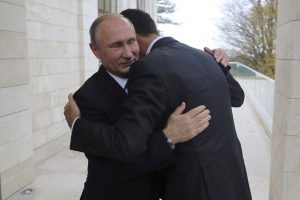
FILE PHOTO: Russian President Vladimir Putin (L) welcomes Syrian President Bashar al-Assad during a meeting in the Black Sea resort of Sochi, Russia November 20, 2017. Sputnik/Mikhail Klimentyev/Kremlin via REUTERS/File Photo
TRYING TO CHOKE OFF ASSAD’S ACCESS TO AIRCRAFT
To sustain his military campaign against rebels, Assad and his allies in Russia, Iran and the Hezbollah militia need access to civilian aircraft to fly in men and supplies. Washington has tried to choke off access to the aircraft and their parts through export restrictions on Syria and Iran and through Treasury Department sanctions blacklisting airlines in those countries. The Treasury Department has also blacklisted several companies outside Syria, accusing them of acting as middlemen.
“These actions demonstrate our resolve to target anyone who is enabling Assad and his regime,” John E. Smith, director of the Treasury Department’s Office of Foreign Assets Control, said in testimony to a congressional committee in November.
In recent years, dozens of planes have been registered in Ukraine to two firms, Khors and Dart, that were founded by a former Soviet marine major and his onetime military comrades, according to the Ukraine national aircraft register. The planes were then sold or leased and ended up being operated by Iranian and Syrian airlines, according to the flight-tracking data.
One of the companies, Khors, and the former marine major, Sergei Tomchani, have been on a U.S. Commerce Department blacklist since 2011 for allegedly exporting aircraft to Iran and Syria without obtaining licenses from Washington.
But in the past seven years, Khors and Dart have managed to acquire or lease 84 second-hand Airbus and Boeing aircraft by passing the aircraft through layers of non-sanctioned entities, according to information collated by Reuters from national aircraft registers. Of these 84 aircraft, at least 40 have since been used in Iran, Syria and Iraq, according to data from three flight-tracking websites, which show the routes aircraft fly and give the call sign of the company operating them.
In September, the U.S. Treasury Department added Khors and Dart to its sanctions blacklist, saying they were helping sanctioned airlines procure U.S.-made aircraft. Khors and Dart, as well as Tomchani, have denied any wrongdoing related to supplying planes to sanctioned entities.
The ownership histories of some of the aircraft tracked by Reuters showed how the U.S. restrictions on supplies to Iranian and Syrian airlines may be skirted. As the ownership skips from one country to the next, the complex paper trail masks the identity of those involved in Syria’s procurement of the planes.
One of the Cham Wings Airbus A320 jets that has made the Rostov-Syria trip was, according to the Irish aircraft register, once owned by ILFC Ireland Limited, a subsidiary of Dublin-based AerCap, one of the world’s biggest aircraft-leasing firms.
In January 2015, the aircraft was removed from the Irish register, said a spokesman for the Irish Aviation Authority, which administers the register. For the next two months, the aircraft, which carried the identification number EI-DXY, vanished from national registers before showing up on the aircraft register in Ukraine.
The Ukrainian register gave its new owner as Gresham Marketing Ltd, which is registered in the British Virgin Islands. The owners of the company are two Ukrainians, Viktor Romanika and Nikolai Saverchenko, according to corporate documents leaked from the Panamanian law firm Mossack Fonseca. Ukrainian business records show they are managers in small local businesses. Contacted by phone, Romanika said he knew nothing and hung up. Saverchenko couldn’t be reached by phone and didn’t respond to a letter delivered to the address listed for him.
In March 2015, Gresham leased EI-DXY to Dart, according to the Ukrainian aircraft register. The identification number was changed to a Ukrainian number, UR-CNU. On Aug. 20, 2015, Khors became the aircraft’s operator, the register showed.
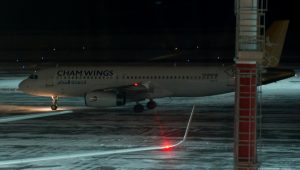
A Cham Wings aircraft is seen at Rostov Airport in Russia, January 17, 2018. Picture taken January 17, 2018. REUTERS/Stringer
A representative of the Ukraine State Aviation Service said the register was not intended as official confirmation of ownership but that there had been no complaints about the accuracy of its information.
From April that year, the aircraft was flown by Cham Wings, according to data from the flight-tracking websites.
Gillian Culhane, a spokeswoman for AerCap, the firm whose subsidiary owned the plane in 2015, didn’t respond to written questions or answer repeated phone calls seeking comment about what AerCap knew about the subsequent owners and operators of the plane. Dart and Khors didn’t respond to questions about the specific aircraft.
Four lawyers specializing in U.S. export rules say that transactions involving aircraft that end up in Iran or Syria carry significant risks for Western companies supplying the planes or equipment. Even if they had no direct dealings with a sanctioned entity, the companies supplying the aircraft can face penalties or restrictions imposed by the U.S. government, the lawyers said.
The lawyers, however, said that the legal exposure for aircraft makers such as Boeing and Airbus was minimal, because the trade involves second-hand aircraft that are generally more than 20 years old, and the planes had been through a long chain of owners before ending up with operators subject to sanctions.
Two of the lawyers, including Edward J. Krauland, who leads the international regulation and compliance group at law firm Steptoe & Johnson, said U.S. export rules apply explicitly to Boeing aircraft because they’re made in the United States. But they can also apply to Airbus jets because, in many cases, a substantial percentage of the components is of U.S. origin.
Boeing said in a statement: “The aircraft transactions described that are the subject of your inquiry did not involve The Boeing Company. Boeing maintains a robust overall trade control and sanctions compliance program.” An Airbus spokesman said, “Airbus fully respects all applicable legal requirements with regard to transactions with countries under U.N., EU, UK and U.S. sanctions.”
WAR-ZONE FLIGHTS
When Reuters sent a series of questions to Khors and Dart about their activities, Tomchani, the former marine major, called the reporter within minutes.
He said he was no longer a shareholder in either firm but was acting as a consultant to them, and that the questions had been passed on to him. He invited the reporter to meet the following day at the high-end Velyur restaurant in Kiev, the Ukrainian capital.
In the 90-minute meeting, he denied providing aircraft to Iran or Syria. Instead, he said, Khors and Dart had provided aircraft to third parties, which he did not identify. Those third parties, he said, supplied the planes on to the end users.
“We did not supply aircraft to Iran,” Tomchani, a man of military bearing in his late 50s, said as he sipped herbal tea. “We have nothing to do with supplying aircraft to Cham Wings.”
Neither Dart nor Khors could have sold or leased aircraft to Cham Wings because they were not the owners of the aircraft, he said.
Tomchani used to serve in a marine unit of the Soviet armed forces in Vladivostok, on Russia’s Pacific coast. In 1991, after quitting the military with the rank of major, he set up Khors along with two other officers in his unit. Tomchani and his partners made a living by flying Soviet-built aircraft, sold off cheap after the collapse of the Soviet Union, in war zones.
Khors flew cargoes in Angola for the Angolan government and Defence Ministry and aid agencies during its civil war. Tomchani said his companies also operated flights in Iraq after the U.S.-led invasion in 2003, transporting private security contractors.
Ukraine’s register of business ownership showed that Tomchani ceased to be a shareholder in Khors after June 2010 and that he gave up his interest in Dart at some point after April 2011. He told Reuters he sold his stakes to “major businessmen,” but declined to name them.
He did say, however, that the people listed at the time of the interview in Ukraine’s business register as the owners of the two companies were merely proxies. One of the owners in the register was a mid-ranking Khors executive, one was an 81-year-old accountant for several Kiev firms, and another was someone with the same name and address as a librarian from Melitopol in southeast Ukraine.
According to the business register, the owner of 25 percent in Khors is someone called Vladimir Suchkov. The address listed for him in the register is No. 33, Elektrikov Street, Kiev. That’s the same address as the one listed in Ukrainian government procurement documents for military unit No. A0515, which comes under the command of the Ukrainian Defence Ministry’s Main Intelligence Directorate.
Tomchani said he and Suchkov were old acquaintances. “He wasn’t a bad specialist,” Tomchani said. “A young lad, but not bad.” He said he believed Suchkov was living in Russia.
Reuters was unable to contact Suchkov. A telephone number listed for him was out of service. The Ukrainian Intelligence Directorate’s acting head, Alexei Bakumenko, told Reuters that Suchkov doesn’t work there.
Reuters found no evidence of any other link between the trade in aircraft and Ukraine’s broader spy apparatus. Ukrainian military intelligence said it has no knowledge of the supply of aircraft to Syria, has no connection to the transport of military contractors from Russia to Syria, and hasn’t cooperated with Khors, Dart or Cham Wings.
On Jan. 9 this year, Dart changed its name to Alanna, and listed a new address and founders, according to the Ukrainian business register. On March 1, a new company, Alanna Air, took over Alanna’s assets and liabilities, the register showed.
CONTRACTORS COME BACK IN CASKETS
Although Moscow denies it is sending private military contractors to Syria, plenty of people say that’s untrue. Among them are dozens of friends and former colleagues of the fighters and people associated with the firm that recruits the men – a shadowy organization known as Wagner with no offices, not even a brass plaque on a door.
It was founded by Dmitry Utkin, a former military intelligence officer, according to people interviewed during this investigation. Its first combat role was in eastern Ukraine in support of Moscow-backed separatists, they said. Reuters was unable to contact Utkin directly. The League of Veterans of Local Conflicts, which according to Russian media has ties to Utkin, declined to pass on a message to him, saying it had no connection to the Wagner group.
Russia has 2,000 to 3,000 contractors fighting in Syria, said Yevgeny Shabayev, local leader of a paramilitary organization in Russia who is in touch with some of the men. In a single battle in February this year, about 300 contractors were either killed or wounded, according to a military doctor and two other sources familiar with the matter.
A Russian private military contractor who has been on four missions to Syria said he arrived there on board a Cham Wings flight from Rostov. The flights were the main route for transporting the contractors, said the man, who asked to be identified only by his first name, Vladimir. He said the contractors occasionally use Russian military aircraft too, when they can’t all fit on the Cham Wings jets.
Two employees at Rostov airport talked to Reuters about the men on the mysterious flights to Syria.
“Our understanding is that these are contractors,” said an employee who said he assisted with boarding for several of the Syria flights. He pointed to their destination, the fact there were no women among them and that they carried military-style rucksacks. He spoke on condition of anonymity, saying he wasn’t authorized to speak to the media.
Reuters wasn’t able to establish how many passengers were carried between Russia and Syria, and it is possible that some of those on board were not in Syria in combat roles. Some may have landed in Damascus, then flown to other destinations outside Syria.
Interviews with relatives of contractors killed in Syria also indicate the A320 flights to Rostov are used to transport Russian military contractors. The widow of one contractor killed in Syria said the last time she spoke to her husband by phone was on Jan. 21 last year – the same day, according to flight-tracking data, that a Cham Wings charter flew to Syria.
“He called on the evening of the 21st … There were men talking and the sound of walkie-talkies. And by the 22nd he was already not reachable. Only text messages were reaching him,” said the woman, who had previously visited her husband at a training camp for the contractors in southern Russia.
After he was killed, she said, his body was delivered to Russia. She received a death certificate saying he had died of “haemorrhagic shock from shrapnel and bullet wounds.”
The widows of two other contractors killed in Syria described how their husbands’ bodies arrived back home. Like the first widow, they spoke on condition of anonymity. They said representatives of the organization that recruited their husbands warned of repercussions if they spoke to the media.
The two contractors had been on previous combat tours, their widows said. The women said they received death certificates giving Syria as the location of death. Reuters saw the certificates: On one, the cause of death was listed as “carbonization of the body” – in other words, he burned to death. The other man bled to death from multiple shrapnel wounds, the certificate said.
One of the widows recounted conversations with her husband after he returned from his first tour of duty to Syria. He told her that Russian contractors there are often sent into the thick of the battle and are the first to enter captured towns, she said.
Syrian government forces then come into the town and raise their flags, he told her, taking credit for the victory.
((Additional reporting by Christian Lowe, Anton Zverev, Gleb Stolyarov and Denis Pinchuk in Moscow and Joel Schectman and Lesley Wroughton in Washington; editing by Kari Howard and Richard Woods))











